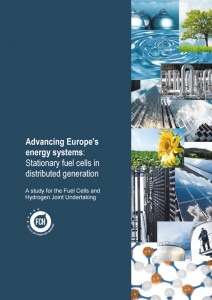
In the scope of the study commissioned by the Fuel Cells and Hydrogen Joint Undertaking (FCH JU), the authors considered different types of stationary fuel cells in differing output ranges and areas of use, and ascertained that in Europe “some are ready for market launch on a large-volume series scale, while others are focusing on research and development and on demonstration projects”. They contrasted fuel cells with several other processes for decentralized energy production, and compared them over a projected time frame of 35 years in three different scenarios (low, moderate and high degree of decentralization). The focus here was on the markets in Germany, Great Britain, Italy and Poland. Natural gas played a key role in the analysis, but biogas and hydrogen were also considered. A focus was also made on the increase in efficiency currently being pursued in Europe as well as on the reduction of emissions.
Most of the statements made on the 185 pages aren’t really new, however, such as “stationary fuel cells can reduce energy consumption and emissions” or “fuel cells can only be competitive if their production costs are reduced”, or “fuel cells are not only able fulfill customers’ requirements concerning home energy supply systems appropriately homogeneously, industry is also able to provide customized solutions on a multi-megawatt scale for special industrial applications, such as in breweries or waste water treatment plants.” With a range of statements like these ones, the authors of the study have attempted to explain in great detail that in their view, fuel cells have the potential to “enable Europe to move across to a new era in energy”.
In this context, it is interesting that the greatest market potential for the conversion and new construction of heating systems in the home energy sector is to be found in Great Britain. By 2030, around 904MWel are expected in the form of new constructions in the UK, while Germany will require around 500MWel. In terms of commercial buildings, Germany is in third place behind Great Britain and Italy – in both 2012 and in 2030. The federal republic will likely only be able to maintain its leading position in the area of industrial applications. In terms of the global competition for micro-CHP systems and selected industrial solutions, author of the study Heiko Ammermann made the following comment: “In Japan, South Korea and the USA, systems of this kind have been on the market for many years. It is now up to the European industry to catch up.”
Expensive findings
While in other countries, six-digit numbers of fuel cell devices are being sold, in Germany, a new and comprehensive study, which was also expensive, was required in order to tell us that there is a “high degree of market potential” for this technology. FCH-JU Director Bert De Colvenaer told H2-international the following: “The study took a whole year to complete (March 2014 until March 2015), and we paid for it – after a formal tendering process – to the tune of EUR 1 million”.
Many of the key statements in the study relate to the demands made by German and European fuel cell companies. In addition to new models of financing such as contracting offers, market activation methods are also demanded, since “stationary fuel cells are not currently competitive from the total costs of ownership perspective”. In particular, the need to reduce the initial investments required (EUR 30,000 to 40,000 per micro-CHP unit) is highlighted, with investment incentives for end customers for example, so that bigger unit volumes can be produced quickly, for which further automation and more standardization is required.
Specifically, the authors recommend funding for the market launch from 2015 onwards in sum total of EUR 8,000 to 12,000 per kWel for 5,000 to 10,000 FC heating devices. In a second industrialization phase, from 2017 until 2020, a further EUR 2,000 to 4,000 per kWel should be invested for another 5,000 to 10,000 units, which corresponds to a total funding volume of EUR 50 to 160 million. Supplemented with funding steps for commercial buildings (EUR 5 to 22 million) as well as industrial applications (EUR 15 to 60 million), this would result in a total funding volume of EUR 70 to 242 million.
Bert de Colvenaer, Executive Director of the Fuel Cells and Hydrogen Joint Undertaking, explained: “Stationary fuel cells have reached a decisive point in Europe and they have a genuine chance for commercialization. The industry should now make good on its technological and commercial promises – with initial financial support provided by the state.”
The following statement, made by Heiko Ammermann, partner of Roland Berger Strategy Consultants, caused some irritation: “Supplying hydrogen doesn’t present a problem.” This is so because it gives the impression that FC heating devices are to be converted to hydrogen-only operations over the long term, which is not the current intention, however.
The study, Advancing Europe’s energy system: stationary fuel cells in distributed generation, was completed by over 30 participants from the industry, who contributed articles in the form of a “study coalition” – as it is called in the masthead. In contrast to scientific studies by independent authors, this paper does not constitute a neutral market analysis but a presentation of the FC industry, how it evaluates the current and also the future situation in the area of stationary fuel cells, and the steps which it considers necessary to be able to work on an economically efficient basis as quickly as possible.
Literature:
Advancing Europe’s energy system: stationary fuel cells in distributed generation, FCH JU, March 2015

























0 Comments